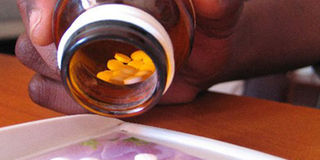Premium
Letting regulators check each other will beat counterfeiters

Counterfeit drugs. The pharmaceutical industry in Kenya now estimated at nearly $600 million (Sh60 billion) in a year. PHOTO | FILE | NATION MEDIA GROUP
What you need to know:
- A vicious battle to eliminate NCQL and transfer all powers of regulation of the industry to PPB has been going on.
- In an opinion dated May 8, the AG ruled in favour of NCQL, stressing that the two entities had distinct and complementary roles.
I once read in a book on corruption theory, that when you have a situation where bribes are paid for government services — such as licences, permits, passports and registration certificates — the best thing to do is to introduce overlapping and create competition between regulatory bodies, with the services provided by more than one entity.
I also read that when you concentrate too much power and discretion in the hands of one bureaucracy run by a clique of powerful civil servants, it will, inevitably, metamorphose into a bribery extraction point.
I make these remarks as an entry point into a discussion about the state of regulation of pharmaceutical imports.
I want to call upon the Cabinet Secretary for the Interior and Co-ordination of the National Government, Dr Fred Matiang’i, to move in quickly and put a stop to the sterile wars between the Pharmacy and Poisons Board (PPB) and the National Quality Control Laboratory (NQCL).
MANDATE
I think Parliament acted with wisdom when it established two distinct regulatory bodies to govern and control the pharmaceutical industry.
The PPB was supposed to deal with registration of medicines, licensing of manufacturing premises, authorisation of imports and exports and registration of pharmacies.
The little-known NQCL was to be in charge of standards, testing of pharmaceutical products for efficacy, and regulation and control of the practice and trade in pharmaceuticals.
The point of departure and wisdom behind creating two entities with mandates that seem to overlap was introduction of checks and balances in the systems.
TURF WAR
When you separate the powers of registering and licensing from the responsibility of analysing and testing the drugs for quality and efficacy, you insulate the system from machinations of politically connected counterfeiters.
Which begs the question: has the system of checks and balances between the two entities worked successfully? The answer is no, and this is why.
Away from the public eye, a vicious battle to eliminate NCQL and transfer all powers of regulation of the industry to PPB has been going on.
It all started in 2017 when the Ministry of Health attempted to ‘kill’ NCQL by surreptitiously introducing an amendment through the Clinical Officers Training Bill 2017.
That strange and sneaky move would not have been detected were it not for the hawk-eyed NQCL staffers.
COMPLEMENTARY
In a rare display of high-mindedness, an employee of the NCQL decided to go to the High Court to seek a judicial review of the move by the minister.
Justice George Odunga declared the move unconstitutional. But the political forces arraigned against NCQL would not stop.
Last May, NCQL attempted to have itself listed on the National Electronic Single Window, operated and run by the state agency Ken Trade.
NCQL had calculated that by being so listed, it would be easier for its analysts to perform the function of testing the drugs and generating the information PPB needed for the purposes of granting licences and registering new imports.
Once again, the ministry came out strongly to oppose the proposal. And NCQL sought a legal opinion from the Office of the Attorney-General on the matter.
In an opinion dated May 8, the AG ruled in favour of NCQL, stressing that the two entities had distinct and complementary roles.
DRUG TESTS
What are the policy implications? Clearly, the government is taking a big risk by allowing confusion and permanent infighting to continue between the two regulators with mandates as critical as preventing imports and distribution of counterfeit drugs.
This is not just a sterile turf war; it is about the efficiency in delivery of services by two key bodies.
There have been many occasions when drugs imported into the country were allowed in despite having failed tests by NCQL.
Way back in 2011, an audit on PPB by the Efficiency Monitoring Unit, which is under the Office of the President, revealed several cases where drugs and medicines that had failed the NCQL test were registered.
GRAY MARKET
Going by the frequency with which the Press is reporting counterfeiting activities — including of bank notes and excise duty stamps — we will soon be at a point of admitting that we have completely lost the battle to rein in counterfeiters.
With the pharmaceutical industry in Kenya now estimated at nearly $600 million (Sh60 billion) in a year, there is a huge motivation to bend the rules.
But the last thing we can do is to allow profiteers to toy with the lives of our people by bringing in fake drugs.
With the recent exponential growth of the gray market for pharmaceutical products in Kenya, only a system where regulatory bodies check one another can resist capture by vested interests.





